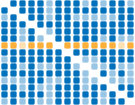Pluie (French)
La pluie, dans la cour où je la regarde tomber, descend à des allures très diverses. Au centre c’est un fin rideau (ou réseau) discontinu, une chute implacable mais relativement lente de gouttes probablement assez légères, une précipitation sempiternelle sans vigueur, une fraction intense du météore pur. A peu de distance des murs de droite et de gauche tombent avec plus de bruit des gouttes plus lourdes, individuées. Ici elles semblent de la grosseur d’un grain de blé, là d’un pois, ailleurs presque d’une bille. Sur des tringles, sur les accoudoirs de la fenêtre la pluie court horizontalement tandis que sur la face inférieure des mêmes obstacles elle se suspend en berlingots convexes. Selon la surface entière d’un petit toit de zinc que le regard surplombe elle ruisselle en nappe très mince, moirée à cause de courants très variés par les imperceptibles ondulations et bosses de la couverture. De la gouttière attenante où elle coule avec la contention d’un ruisseau creux sans grande pente, elle choit tout à coup en un filet parfaitement vertical, assez grossièrement tressé, jusqu’au sol où elle se brise et rejaillit en aiguillettes brillantes.
Chacune de ses formes a une allure particulière: il y répond un bruit particulier. Le tout vit avec intensité comme un mécanisme compliqué, aussi précis que hasardeux, comme une horlogerie dont le ressort est la pesanteur d’une masse donnée de vapeur en précipitation.
La sonnerie au sol des filets verticaux, le glou-glou des gouttières, les minuscules coups de gong se multiplient et résonnent à la fois en un concert sans monotonie, non sans délicatesse.
Lorsque le ressort s’est détendu, certains rouages quelque temps continuent à fonctionner, de plus en plus ralentis, puis toute la machinerie s’arrête. Alors si le soleil reparaît tout s’efface bientôt, le brillant appareil s’évapore: il a plu. | Uploaded by | P. T. |
| Source of the quotation | http://www.cbeditions.com |
|
Rain (English)
The rain, in the courtyard where I watch it fall, comes down at very different speeds. In the centre, it is a fine discontinuous curtain (or mesh), falling implacably but relatively slowly, a drizzle, a never-ending languid precipitation, an intense dose of pure meteor. Not far from the right and left walls heavier drops fall more noisily, separately. Here they seem to be about the size of a grain of wheat, there of a pea, elsewhere nearly a marble. On the moulding, on the window ledges, the rain runs horizontally while on the undersides of these same obstacles it is suspended, plump as a humbug. It streams across the entire surface of a little zinc roof the peephole looks down on, in a thin moiré sheet due to the different currents set in motion by the imperceptible undulations and bumps in the roofing. From the adjoining gutter, where it runs with the restraint of a brook in a nearly level bed, it suddenly plunges in a perfectly vertical, coarsely braided stream to the ground, where it splatters and springs up again flashing like needles.
Each of its forms has a particular speed; each responds with a particular sound. The whole lives as intensely as a complicated mechanism, as precise as it is chancy, a clockwork whose spring is the weight of a given mass of precipitate vapour.
The chiming of the vertical streams on the ground, the gurgling of the gutters, the tiny gong beats multiply and resound all at once in a concert without monotony, not without delicacy.
When the spring is unwound, certain gears continue to function for a while, gradually slowing down, until the whole mechanism grinds to a halt. Then, if the sun comes out, everything is erased, the brilliant apparatus evaporates: it has rained. | Uploaded by | P. T. |
| Source of the quotation | http://www.cbeditions.com |
|




